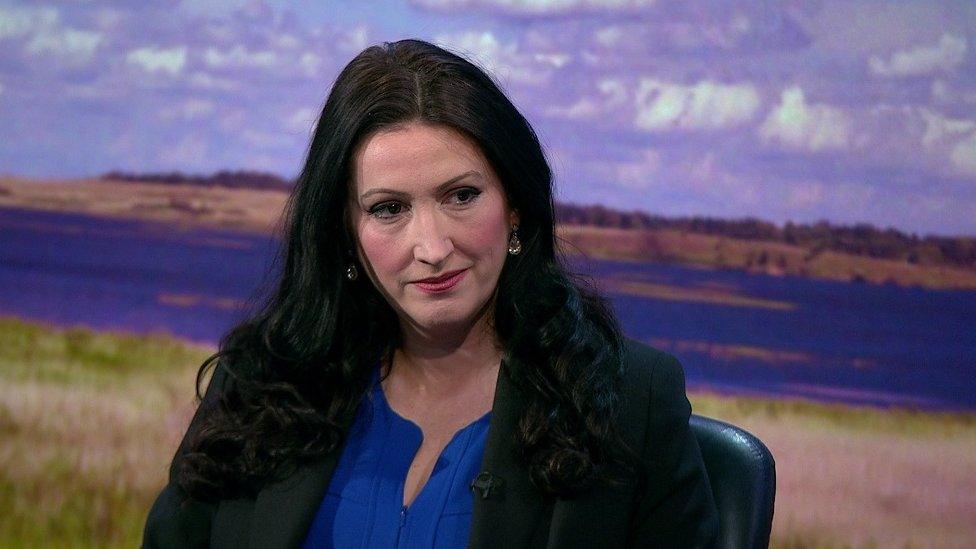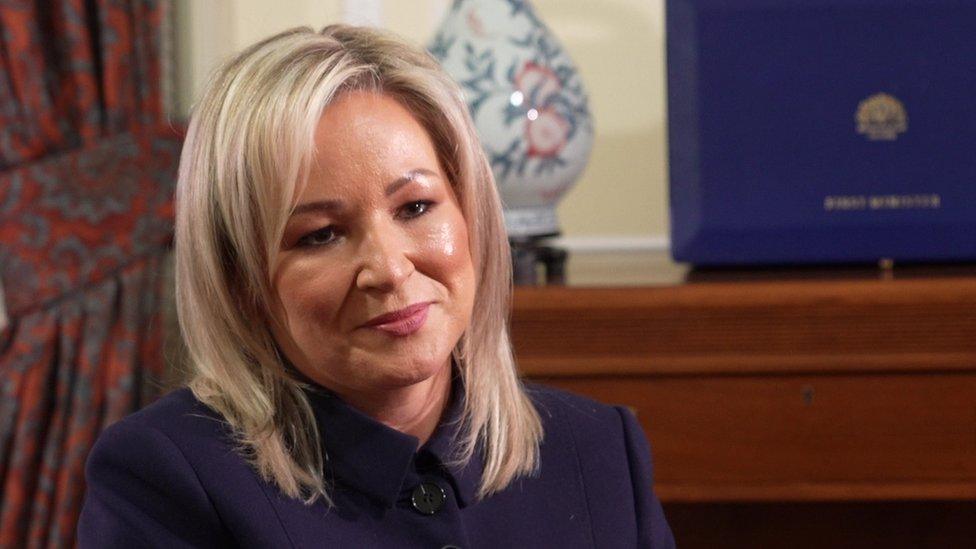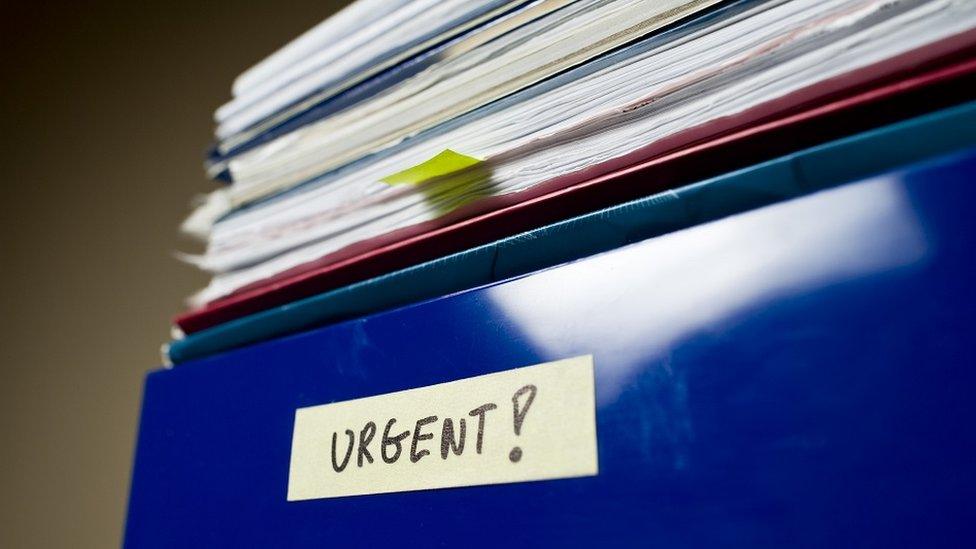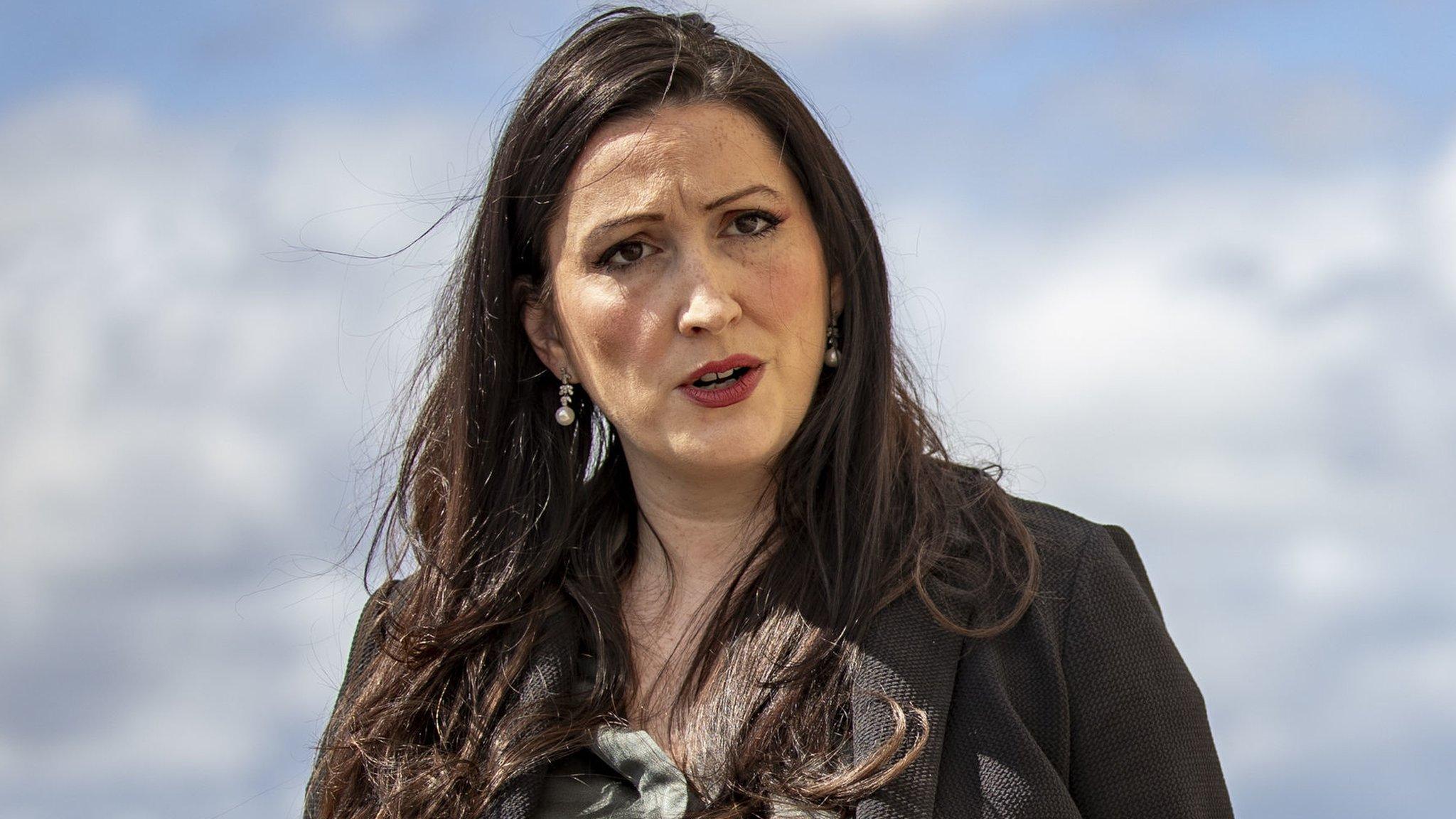Emma Little-Pengelly: People shouldn't pay more for poor services
- Published

Deputy First Minister Emma Little-Pengelly says revenue-raising proposals will put pressure on "hard-pressed" families
It is unsustainable to ask people to pay more for "poor public services" in Northern Ireland, according to Deputy First Minister Emma Little-Pengelly.
The Democratic Unionist Party (DUP) member said she has serious concerns about how revenue-raising measures may place pressure on struggling families.
The UK government is due to release a £3.3bn package now that power sharing has been restored at Stormont.
About £580m of that cash is to settle public-sector pay claims.
More than £1bn is to be used for "stabilisation" of public services.
However, the funding package also comes with the condition that the Northern Ireland Executive will commit to additional revenue raising, which could mean imposing new or higher taxes or charges on households and businesses.
'Not up to scratch'
Speaking to BBC's Sunday Politics Ms Little-Pengelly said Northern Ireland had a "huge number of really pressed families, really squeezed families in terms of their income".
"Many of those families are the very same families who are trying to bring up children, stay in work, get childcare. We know how much financial pressure these families are under," she added.
"A number of these proposals will do nothing but put additional pressure on those hard-pressed families at a time of a cost-of-living crisis."
She said the executive needed to be "looking at additional support such as childcare to support those families".
She also said there were issues with Northern Ireland's public services.
"The quality of our public services is not up to scratch and asking people right now to pay more for poor public services, I don't think is a sustainable decision," she added.
In a statement on Sunday evening, a Northern Ireland Office spokesperson said the government had "provided the new Executive with an unprecedented £3.3bn spending settlement to deliver for the people, communities and businesses of Northern Ireland".
"As with any other administration in the UK, the Executive will need to make choices to support stability, prosperity, and sustainable public services."
Meanwhile, Economy Minister Conor Murphy said that he is opposed to increasing tuition fees for university students in Northern Ireland.
Last year, the Department for the Economy had modelled increasing fees to about £7,000 a year from the current £4,630 to raise money for the government budget.
But significant changes to fees would require a decision by a Stormont minister and a change in legislation.
The department had to find savings of about £130m in 2023-24.
However, speaking to BBC NI, Conor Murphy says he believes this increase of approximately £2400 would prevent people from being able to afford higher education.
"I don't think increasing fees is the way to go, I think that's likely to reduce uptake in places in universities," he said.
"We want to see more young people get the right skills and the right education.
"I'm happy to discuss the funding issue with universities and try and work some solution that can create more opportunities for young people."
'Starved' by government

Michelle O'Neill says parties in the Stormont Executive will be turning their attention to how Northern Ireland is funded
Last week, First Minister Michelle O'Neill said that all parties in the Stormont Executive agreed that Northern Ireland needs a better funding model from Westminster.
She said Northern Ireland's public services were being "starved" by the government.
Ms O'Neill said the offer from the Treasury "acknowledged that we're underfunded", adding that it was an issue "we're all going to turn our attention to so that we can then in turn do things better in terms of health, education and public services".
DUP leader Sir Jeffrey Donaldson has warned that the money earmarked for pay would fall short of what is currently paid.
A revenue-raising plan is expected to be published by May, alongside a public service transformation plan.
Allow X content?
This article contains content provided by X. We ask for your permission before anything is loaded, as they may be using cookies and other technologies. You may want to read X’s cookie policy, external and privacy policy, external before accepting. To view this content choose ‘accept and continue’.
Responding to BBC's Sunday Politics programme, Julian Smith said the Northern Ireland Executive "cannot any longer avoid revenue raising".
"If [the] executive doesn't do it, [His Majesty's Government] will no doubt have to," the former Northern Ireland secretary posted on X, formerly Twitter.
'Get back and deliver'
Meanwhile, the DUPs deputy first minister has rejected criticism from three party colleagues about the deal her leader negotiated.
This comes as a joint letter from DUP chairman Lord Maurice Morrow, Lord Nigel Dodds and East Antrim MP Sammy Wilson stated that they do not share the view of those in the DUP who believe that the Irish Sea border issue has been dealt with.
Speaking to Sunday Politics, Ms Little-Pengelly said: "The party executive has made their decision, and that was to get back into government and to deliver.
"That was based on a good and fair deal that Sir Jeffrey Donaldson has achieved.
"No negotiation is ever perfect, but what he has achieved is significantly more than what people thought he could achieve," she added.
- Published3 February 2024

- Published3 February 2024

- Published4 February 2024
